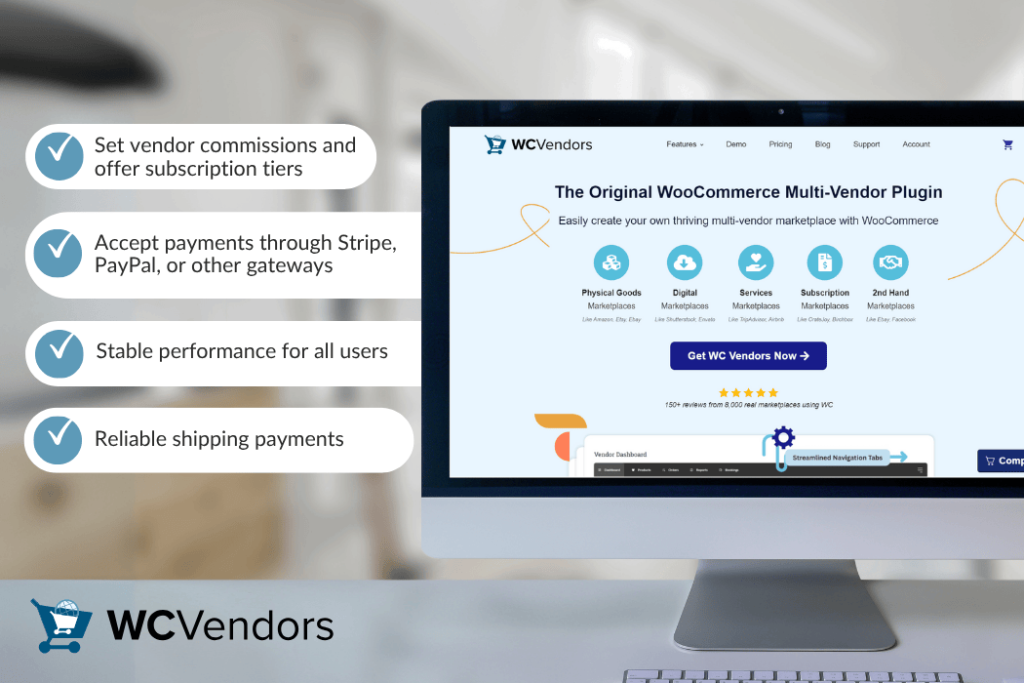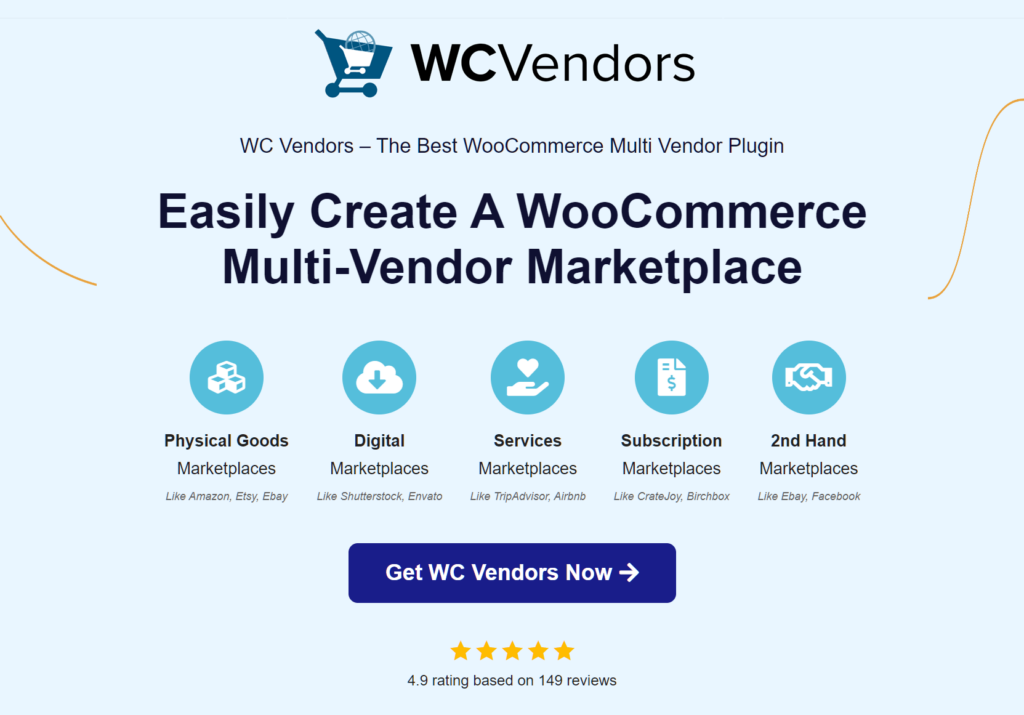
Many online sellers eventually look for the best Shopify alternatives as they outgrow the platform’s built-in limitations. While Shopify offers a quick start, it can become restrictive once you need more control, flexibility, or support for multi-vendor features.
As a result, sellers begin comparing other platforms that offer better customization, lower long-term costs, or ownership of their store data.
This guide offers a clear comparison of ecommerce platforms to help you find a solution that fits your needs. You’ll see how pricing, vendor support, and customization vary across platforms—and why WC Vendors paired with WooCommerce stands out for building scalable marketplaces.
So, let’s get started!
Why Look For The Best Shopify Alternatives?
Shopify provides a quick start for launching an online store. However, it often lacks the flexibility and ownership many sellers need as they grow.
Here’s why many merchants are seeking an alternative to Shopify:
- Monthly fees add up, especially with app and transaction costs
- Limited customization unless you’re on a high-tier plan
- Restricted checkout and payment gateway choices
- Challenges scaling into a WooCommerce multi-vendor setup
- Dependence on a closed platform
If you’re building a long-term ecommerce business or a multi-vendor marketplace, you’ll likely want more control than Shopify offers.
Key Features To Look For In Shopify Alternatives
Not every platform fits every seller. When evaluating Shopify competitors, consider the following:
- Customization – Can you tailor your storefront and features freely?
- Ownership – Do you control your data, payments, and hosting?
- Scalability – Can it support growth into a WooCommerce marketplace or support multiple vendors?
- Cost – Are fees predictable, or do they grow with your sales?
- Design flexibility – Does it offer themes or tools suited for your ecommerce store?
Choosing the right website builder depends on your goals. This vendor platform guide explains what features matter most when managing multiple vendors.
Comparison Table: Best Shopify Alternatives At A Glance
| Platform | Best For | Pricing (Starting) | Multi-Vendor Ready | Customization |
|---|---|---|---|---|
| WooCommerce + WC Vendors | Marketplaces & full control | $99/year (Starter Plan) | Yes (native) | High |
| BigCommerce | Medium to large businesses | $39/month | Via integrations | Moderate |
| Wix eCommerce | Beginners & creatives | $27/month | Limited | Easy |
| Squarespace Commerce | Designers & service sellers | $23/month | Limited | Moderate |
| Adobe Commerce (Magento) | Enterprise-scale ecommerce | Custom pricing | Yes (advanced) | High |
| Shift4Shop | Cost-sensitive businesses | Free with processor | Limited | Moderate |
1. WooCommerce + WC Vendors (Best for Multi-Vendor Marketplaces)
If you want full control over your online store and plan to grow into a marketplace, WooCommerce paired with WC Vendors is a powerful choice.
Unlike all-in-one hosted platforms, this self-hosted solution gives you ownership of every part of your business—from storefront design to vendor settings.
Pros
- Complete ownership and open-source flexibility
- Vendor commissions, subscriptions, and storefront control
- Wide plugin and theme support
- Built-in WooCommerce marketplace plugin with WC Vendors
Cons
- Requires setup and hosting
This option is ideal for sellers who want to create a highly customizable, scalable WooCommerce multi-vendor platform tailored to their niche. You won’t be locked into a specific workflow or pricing model.
2. BigCommerce (Best for Larger Businesses With Built-in Features)
BigCommerce is a popular Shopify alternative for mid-sized to large companies. It offers more built-in features out of the box than Shopify, including better SEO tools and multi-currency support without the need for extra apps.
Pros
- Native support for multi-currency and B2B selling
- No transaction fees on any plan
- Strong API access for custom integrations
- More advanced out-of-the-box tools than most Shopify competitors
Cons
- Monthly cost is higher than other Shopify alternatives
- Design flexibility is more limited than WordPress-based platforms
BigCommerce suits sellers looking for enterprise-level tools without relying on third-party apps. However, if you want complete control over your marketplace or plan to add multiple vendors, it may fall short compared to a WooCommerce marketplace plugin.
3. Wix eCommerce (Best for Simple Stores and Beginners)
Wix started as a website builder, but now includes eCommerce functionality for solopreneurs and small brands. Its drag-and-drop tools make it beginner-friendly with visually appealing templates.
Pros
- Easy to use with pre-designed templates
- Built-in marketing tools and analytics
- Supports digital and physical ecommerce store setups
Cons
- Not suitable for larger, complex marketplaces
- Limited scalability and vendor management options
Wix is a free alternative to Shopify for basic needs, but it lacks vendor features, multi-storefront capabilities, and plugin freedom. It’s best for small online store owners who prioritize ease of use over scalability.
4. Squarespace Commerce (Best for Creatives and Design-Focused Brands)
Squarespace is known for sleek design templates, making it a solid Shopify alternative for artists, photographers, or personal brands. It works well if you’re selling a small catalog of items with visual appeal.
Pros
- Professional-grade design templates
- Easy-to-use product and inventory management
- Includes SEO and basic email marketing tools
Cons
- Limited payment gateway options
- Lacks multi-vendor support or advanced selling features
If your goal is to build a visually polished ecommerce website quickly, Squarespace is worth considering. But if you plan to scale with vendor onboarding and need marketplace flexibility, a WooCommerce multi-vendor solution will serve you better.
5. Adobe Commerce (Formerly Magento – Best for Enterprise Solutions)
Adobe Commerce offers extreme flexibility and scalability. It’s a good alternative to Shopify for large brands with custom workflows and in-house developers.
Pros
- Extremely customizable with full backend access
- Suitable for global marketplaces and advanced integrations
- Strong support for multi-store and enterprise-level commerce
Cons
- High cost of development and hosting
- Requires experienced technical teams to manage
Adobe Commerce works well for high-volume sellers who need custom features. But it’s often overkill for startups or SMBs who just need a simple online store. You may also need to rely on third-party solutions or extensions for multi-vendor functionality.
How WC Vendors + WooCommerce Compares As A Shopify Alternative

While hosted platforms may offer a fast start, WooCommerce with WC Vendors gives you the control and flexibility needed to run a sustainable, scalable marketplace.
With this setup, you can:
- Set vendor commissions and offer subscription tiers
- Accept payments through Stripe, PayPal, or other gateways
- Customize your online store to reflect your brand identity
- Equip sellers with their own dashboards, analytics, and product controls
You’re not just patching something together—this is a complete WooCommerce marketplace plugin built specifically for multi-vendor growth.
Moreover, if you’re aiming for long-term success with fewer restrictions and full ownership, this is one of the best Shopify alternatives available today.
Final Thoughts
Shopify is a widely used ecommerce platform, but it’s far from the only option worth considering. For sellers who want more flexibility, customization, or long-term value, there are strong alternatives that may align better with your goals.
To recap, here’s what you need to consider before choosing a platform:
- Why Look for the best Shopify Alternatives?
- Key Features To Look For
- Comparison Table: Best Shopify Alternatives
- WooCommerce + WC Vendors
- BigCommerce
- Wix eCommerce
- Squarespace Commerce
- Adobe Commerce (Magento)
- How WC Vendors + WooCommerce Compares As a Shopify Alternative
If you’re ready to take control and scale your business, consider a vendor-powered solution that supports your growth. Explore our plans or test-drive features on our demo site today.

